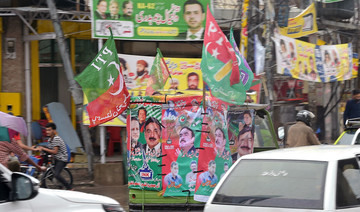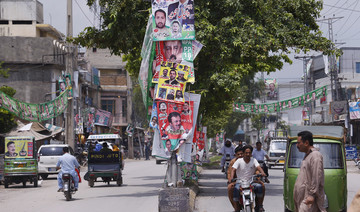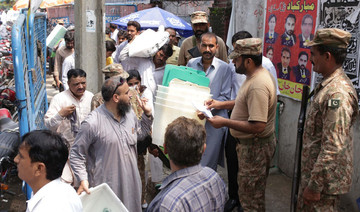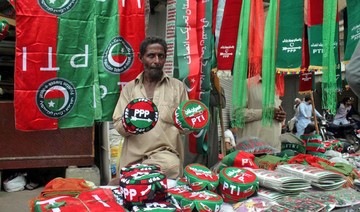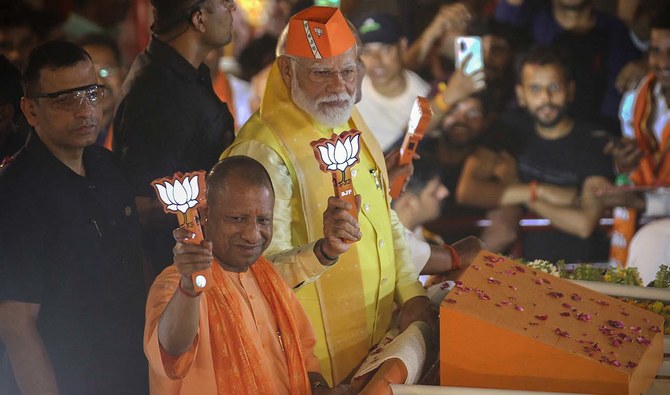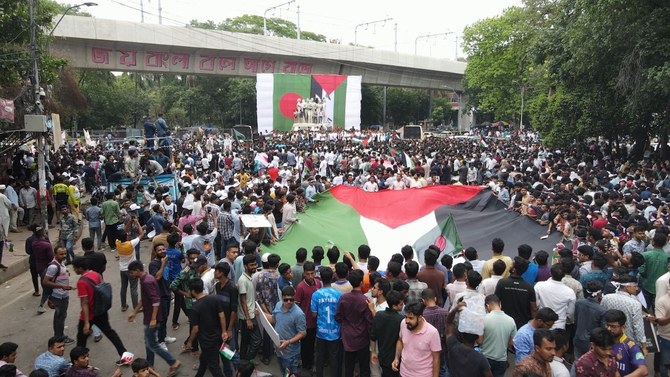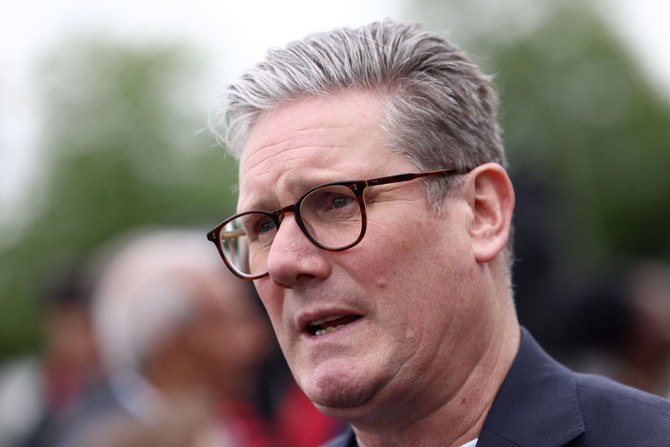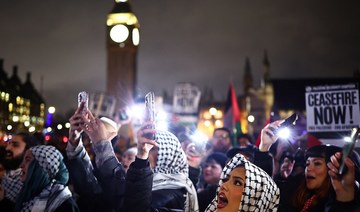LAHORE: Polls have opened in Pakistan for an election that marks only the second transition between civilian governments in the country. However, the significance of such a landmark moment is likely to be lost on some voters who have little faith in the democratic process due to widespread allegations of electoral manipulation.
After 23 years prowling the margins of Pakistani politics, most analysts and opinion polls predict great success for cricketing hero-turned-politician Imran Khan, whose Pakistan Tehreek-e-Insaf (PTI) party is expected to win the most seats.
Support for Khan, Pakistan’s most famous ladies man and biggest crossover sports celebrity, has surged in the past 18 months due to the corruption trial of ousted former Prime Minister Nawaz Sharif, head of the Pakistan Muslim League-Nawaz (PML-N), over the purchase of upscale London flats using offshore accounts.
Though Sharif was convicted and is now in jail, Wednesday’s election is still expected to be a close-fought battle between his PML-N and Khan’s PTI.
“The day belongs only to Imran Khan, there is no question about it,” said Fawad Chaudhry, a PTI spokesman.
That might prove to be true but there is mounting evidence that it has not come about without electoral manipulation, including selective targeting of Khan’s opponents, intimidation of Sharif loyalists to force them to defect to PTI, and pressure on the Pakistani media to mute any coverage critical of Khan or the army.
“Over the past few months, we’ve watched the establishment deploy old and new tactics to politically engineer these elections,” said Madiha Tahir, a Pakistan specialist at Columbia University. “At least military coups were honest — we knew what was happening. What we’ve seen in this election cycle is intense obfuscation.”
The military, which ruled Pakistan for about half its 71-year-old history, denies it has interfered in the campaigning.
Although almost 200 people have been killed in militant attacks during the run-up to the election, polling day is expected to be free of violence, with 371,000 troops, three times more than in 2013, set to be deployed outside and inside polling stations as 105 million Pakistanis cast their votes.
Whoever emerges victorious, the new government will have its hands full dealing with a host of problems, including water shortages, a currency crisis and plummeting foreign currency reserves that threaten to send Pakistan knocking on the doors of the International Monetary Fund looking for yet another bailout. Matters are made worse by the enduring threat posed by the Taliban and Daesh militants, and thorny relationships with long-time ally the US and neighboring rivals India and Afghanistan.
If, as expected, no party wins a clear majority, the people of Pakistan will have to brace themselves for weeks of political haggling to assemble what is likely to be a weak coalition government that will have trouble pushing through badly needed reforms. To complicate matters, Khan, who is known for his fiery stubbornness, has repeatedly stated he is wary of entering any governing alliance with either of the established parties, which he considers ultra corrupt: PML-N and the Pakistan People’s Party, which is led by Bilawal Bhutto Zardari, the 29-year-old son of assassinated former Prime Minister Benazir Bhutto.
“The major question is will July 25 produce a government united and strong enough to rule Pakistan decisively and push reforms or will it be so weak and divided that it can neither make policies nor be able to rule without interference from unelected forces,” said lawyer and columnist Babar Sattar.
Michael Kugelman, a South Asia specialist at the Woodrow Wilson Center, said a fractious, divided government “raises the possibility that the military could broaden its portfolio.”
Voters on Wednesday will elect 272 members of the National Assembly. To win a simple majority, a party needs to take at least 137 seats. A further 70 seats, mostly reserved for women and members of non-Muslim minorities, are allocated to the parties on the basis of their performance in the contested constituencies, and so to have an overall majority of the 342 total seats, one party needs to have at least 172 of them.
“I’m not scared, I’m really excited to be a part of something new,” said 23-year-old Mustafa Ameer. He is a student in Lahore, the capital of Pakistan’s richest and most populous province, Punjab, which is the heart of Sharif’s power base. “We have had the same corrupt rulers for too long and I can’t wait to vote for change.”
Khan is confident he will make gains in Punjab, which accounts for 141 of the elected seats, but PML-N could ride a wave of sympathy due to the drama surrounding Sharif’s recent return to Pakistan with his daughter, Maryam, to face their conviction and jail sentences over corruption charges, while leaving his ailing wife behind in London.
Ahsan Iqbal, who held the joint portfolio of planning and interior minister in Sharif’s last Cabinet, said PML-N had delivered on its promises to increase economic growth, reduce energy shortages and terrorist attacks, and improve the state of the education sector.
“That is why I am very hopeful that tomorrow the world will see that despite the manipulation of this election, the result will reflect the people’s voice,” he said. “The PML-N will still emerge as the largest party.”
Opinions polls suggest Khan is gaining ground, however, with one survey showing PTI pulling ahead of PML-N and another placing it only slightly behind.
The PPP is in third place.
Though support for the party has slumped considerably in recent years, and its support is now mostly concentrated in the southern Sindh province, the young and charismatic Zardari has energized the election with a strong, issues-based campaign centered on human and minority rights.
“His message is unapologetically inclusive and progressive in a deeply polarized national discourse fueled by deep wells of hate and intolerance,” said Sherry Rehman, leader of the opposition in the senate and a senior PPP figure.
The candidates for Wednesday’s vote also feature a bumper crop of ultra-Islamist groups. Many of them are militant-linked and were reportedly persuaded by the army to abandon their violent history and enter the political mainstream to contest elections as potential spoilers for the PML-N. The army denies these allegations.
“Allowing terrorists and extremists who have been responsible for so many deaths to come into the mainstream without any process of disarmament, deradicalization, re-education and public pledges of non-violence will only polarize the public even more and lead to fiery confrontations either just before or after the elections,” said Pakistani author Ahmed Rashid.




